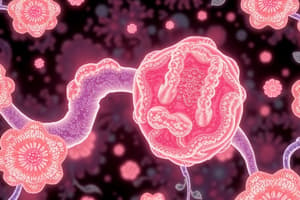Podcast
Questions and Answers
What does MHC stand for?
What does MHC stand for?
- Microbial Histocompatibility Complex
- Mitochondrial Histocompatibility Complex
- Molecular Histocompatibility Complex
- Major Histocompatibility Complex (correct)
What are Human Leukocyte Antigens (HLA)?
What are Human Leukocyte Antigens (HLA)?
Molecules found on all nucleated cells that help the immune system recognize foreign cells.
How many classes of membrane markers are there in MHC?
How many classes of membrane markers are there in MHC?
Three classes: Class 1, Class 2, and Class 3.
MHC Class 1 is found only on specific immune cells.
MHC Class 1 is found only on specific immune cells.
What does MHC Class 1 do?
What does MHC Class 1 do?
What happens when a leukocyte approaches a healthy cell with MHC Class 1?
What happens when a leukocyte approaches a healthy cell with MHC Class 1?
What is the structure of MHC Class 1?
What is the structure of MHC Class 1?
MHC Class 2 is found on B lymphocytes, macrophages, and dendritic cells.
MHC Class 2 is found on B lymphocytes, macrophages, and dendritic cells.
What does MHC Class 2 do?
What does MHC Class 2 do?
Describe the process of MHC Class 2 binding.
Describe the process of MHC Class 2 binding.
What is the primary structure difference between MHC Class 1 and Class 2?
What is the primary structure difference between MHC Class 1 and Class 2?
Flashcards are hidden until you start studying
Study Notes
Major Histocompatibility Complex (MHC)
- Family of genes encoding cell surface proteins known as MHC molecules.
- MHC class I and II play vital roles in antigen presentation to T cells.
- Essential for distinguishing between human and foreign cells.
- Foreign MHC molecules in transplanted tissue can trigger T cell responses, potentially resulting in transplant rejection.
Human Leukocyte Antigen (HLA)
- Molecules present on all nucleated body cells, aiding in the identification of foreign cells by the immune system.
- Inherited from parents and crucial for assessing compatibility in organ transplantation (e.g., kidneys, pancreases).
- Major HLA antigen groups include HLA-A, HLA-B, and HLA-DR.
Three Classes of Membrane Markers (MHC)
- MHC is categorized into three classes: Class I, Class II, and Class III.
MHC Class 1
- Present on most nucleated cells, they help differentiate healthy cells from infected ones.
- Healthy cells present self-antigens on MHC class I, aiding leukocytes in recognizing these cells and leaving them undisturbed.
MHC 1 Binding for Healthy Cell
- Healthy cells bind normal peptides (self-antigens) to MHC class I.
- Leukocytes recognize these self-antigens, resulting in the preservation of healthy cells.
MHC 2 Binding for Infected Cell
- In infected cells, viral peptides are produced and displayed on MHC class I.
- Leukocytes identify these antigens, marking the cells for degradation.
MHC Class 1 Structure
- Composed of alpha 1, alpha 2, alpha 3 (linked to the cell membrane) and beta 2.
- Features a large "cleft" for binding self-antigens.
MHC Class 2
- Exclusively found on specific immune cells such as B lymphocytes, macrophages, dendritic cells, and some T lymphocytes.
- Crucial for communication among immune cells.
MHC Class 2 Binding
- Macrophages engulf foreign cells and release antigens.
- The antigen is positioned in the MHC class II complex to attract Helper T Cells via interleukin-1.
- Helper T Cells bind to the MHC class II and antigen, releasing interleukin-2 to recruit B-Lymphocytes and T-Lymphocytes.
- This process enables differentiation into plasma cells, cytotoxic cells, and memory cells.
MHC Class 2 Structure
- Similar to Class I but includes beta 1 and beta 2 (attached to the membrane), along with alpha 1 and alpha 2 (also attached to the membrane) peptides.
Studying That Suits You
Use AI to generate personalized quizzes and flashcards to suit your learning preferences.




